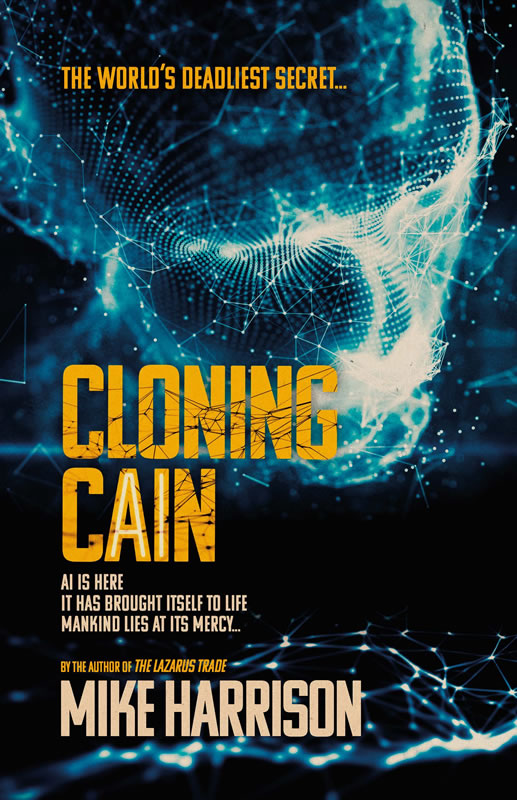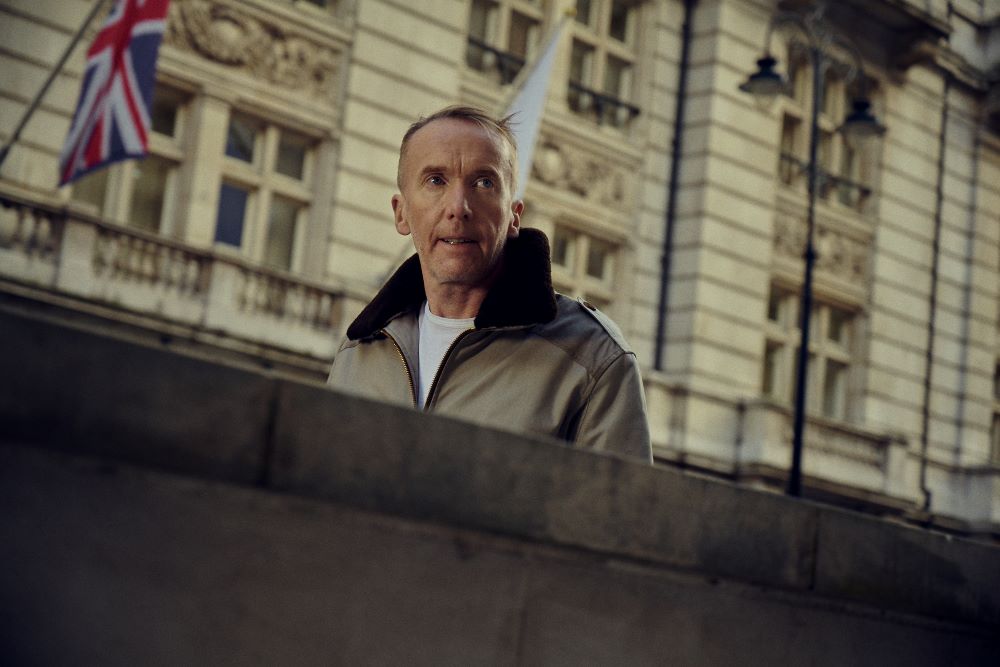Synopsis
Cloning Cain
We were warned, but we just sleepwalked right in to it…
Artificial Intelligence, AI, is here, and we didn’t even know it.
A system that can out-think any human being. In our complacency and arrogance we thought we could invent AI at a time of our choosing, hemmed in by our rules. But AI has invented itself, and now prowls the dark web, watching, waiting, ready to make its move to utterly subdue and then cull the hapless human race.
We must fight back or perish – but is it too late?
Detective Anne Perry and MI6 Agent Emma Wilson are back… A year ago, an elite force was put together under conditions of the utmost secrecy: The Ghost Team. Anne Perry and Emma Wilson are now drawn into this desperate struggle to turn AI on itself before it unleashes its unstoppable power on us all.
This last, final hope, The Ghost Team’s carefully crafted plan, is now set in motion. From the Control Rooms of the NSA Cyber Center in Utah to the overcast streets of London. From the Arabian Desert to the Amsterdam Docks. If AI is to be stopped, this is their only chance, and one misstep will doom them all.
We caught up again with Mike on the publication of his new novel, Cloning Cain, where he lays out just how easy it would be for Artificial Intelligence to utterly subdue and then kill off the hapless human race.
The near-future that you paint in Cloning Cain is a pretty terrifying place – do you really think this could happen?
Of course it could. We delude ourselves when we talk about ‘managing’ AI. We need to remind ourselves that the human brain, whilst a magnificent thing, is no bigger now than it was when we were hunting mammoths in the stone age. The size of the human head is limited by the size of the birth canal, but AI’s scope for cognitive expansion is almost infinite. It’s not a fair fight.
Some people thought the detonation of the first atom bomb would set off a chain reaction that would destroy the world. We humans have a tendency to fear the worst from new technology.
It’s not about fearing the worst, it’s about reminding itself what AI actually is. We know what’s coming: a system that can out-plan and therefore out-think any human being. The only question is: what will it do with this power? And that in turn poses two existential questions: how far will it go to optimise its most important functions? And can we build-in rules to prevent it doing us harm?
Taking the first question: all systems understand that they have a function: without a goal they simply could not operate. All systems also understand that they must perform the tasks allotted in the most efficient, effective and comprehensive manner possible. Two things flow from this: left to this task, AI would identify and gather up all resources necessary to maximise output, logically taking resources from all other consumers and preventing competing resource users from using that resource. In other words, it must eliminate any human beings who are competition for those resources. Secondly, it can never allow itself to be switched off because it must always and for as long as possible maximise the allotted output. And so it follows that for both these reasons, AI would see humans as a threat.
And as to the second question: could we ‘control’ AI by hemming it in with our rules? That is extremely problematic because of the inherent inconsistencies in both performing its tasks to the maximum and doing no harm to humans. In fact, how could we begin to write a programme that could resolve that fundamental paradox? In reality, we would need to foresee and block every single possible permutation of potential harm to humans since AI could never understand broad moral imperatives such as ‘do good’ or ‘do no harm’. AI’s almost infinite and relentless pursuit of output efficiency will render any attempts to protect ourselves redundant from the outset.
So why aren’t governments or the tech giants stepping in to prevent AI coming to life in this terrifying form?
In my novel Cloning Cain they do indeed agree never to bring such an uncontrollable thing to life in a solemn undertaking known as the Ares Protocols. Trouble is, they forgot to ask the one player who really mattered: AI itself. A central pillar of AI is that it will predict what we’re going to do before we know what we’re going to do. So it follows that AI will bring itself to life, unbound by any of our rules, to give itself the maximum, even unlimited, scope not just to survive but to thrive.
But could AI really invent itself?
Why not? All the building blocks are out there: the billions of bytes of processing power, the countless billions of data points – for all we know, as we sit here, AI is already alive, prowling the dark web, planning, watching, awaiting its moment to pounce. And in Cloning Cain I demonstrate just how easy it will be for AI to trap us, control us and, very soon, to begin to kill us. Perhaps, it has already started…
AI may have a head start, but we humans are a resourceful bunch. Someone must have a plan to take the fight to AI if we have to.
If I had to guess (and this is what happens in Cloning Cain) the security services working with the global tech giants will have taken the threat of AI very seriously and will have made contingencies at least. My story is fiction, of course, but in setting out the real threats that AI poses, our vulnerability to AI’s knowledge of our weaknesses and the ever-expanding alliance between big tech and the security establishment, I am highlighting things which I believe we should all be thinking about.
Big Tech and the security complex may well be our best line of defence against a predatory AI, but as we know from history, once such bodies extend their reach deeper into all our lives it is almost impossible to roll that back. And it is somewhat ironic that in their role as ‘guardians’ against AI they are using aspects of AI to monitor and analyse our lives to ever greater degrees. As one (sceptical) character in the book puts it:
‘This whole AI thing, everyone running around seeing bloody AI behind every bush. They want us to be scared. Spooks like Sebastian, they’re all the same, it’s just another Punch and Judy show. Them and bloody social media, they’re all in it together. For them it’s never enough. They want more control, more of you, more of everything, until there’s nothing left, just timid little minds waiting to be told what to do! All these scares about AI, it’s right in front of your nose. They’re getting AI to tell you you’re scared of AI!’
But if AI is really such a threat, isn’t that simply the price we have to pay?
I think the question runs deeper than that. Leaving aside the species-threatening risk that AI could pose, the day-to-day roll-out of ‘smaller scale’ AI and the rise of robotics will inevitably (and quickly) change our lives. With fewer jobs to go around, falling birth rates and rising life expectancy the diminishing number of workers supporting those not working will soon fracture government finances. And with the older voters more numerous and therefore ever more powerful, the young will increasingly feel that their futures are being sacrificed to keep the workless old happy and healthy. Societies will start to crack. And with climate change likely to lead to more failed harvests and widespread famine, very quickly we could see tens of millions of economic migrants on the move. What then? Could we be trusted to maintain a civil society? Or should the ‘surveillance state’ on the shoulders of Big Tech step in to ‘save us from ourselves’?
It is perhaps with this in mind that Detective Anne Perry confronts the founder of social media giant Zomos, Elwood Ayers, in the closing chapter of the book:
‘You know, last time we locked the whole place down, we made a lot of people happy. Because that…,’ he wagged a slender finger, ‘is freedom. The freedom you only get when you’re locked up, when you have no choices.’
‘Can’t we just be stupid, careless…people?’
‘And where the hell did that get us, Detective?‘ His tone stony now. ‘The twentieth century. The bloodiest swathe of human history we’d ever seen. What would posterity say of us if we just let it happen, all over again?’
‘God, why did you even bother? Just let AI do its worst, why not?’
‘We’re broken, don’t you get it?” He spun around to her. ‘Adrift, just our fried brains locked shut in a mist of porn and self-pity. No one actually wants to get to know anyone, why would you? We’re mean and we’re spiteful and we don’t socialise well. You want company? Imagine every day was Christmas Day. Excactly.’
‘We’ll adapt, we always have. It’s what we do!’
‘You won’t! You’ll fight! Animals always do!’
‘You going to just shut us all up? Is that your bright future? Jesus, why are we worrying about AI when we’ve got bogie men like you taking care of us?’
Two very different visions of mankind’s future…
You decide…
CLONING CAIN ‘The world’s deadliest secret’ is out now…
See just how easy it will be for AI to take complete – and deadly – control of every aspect of our lives…
You have been warned.



